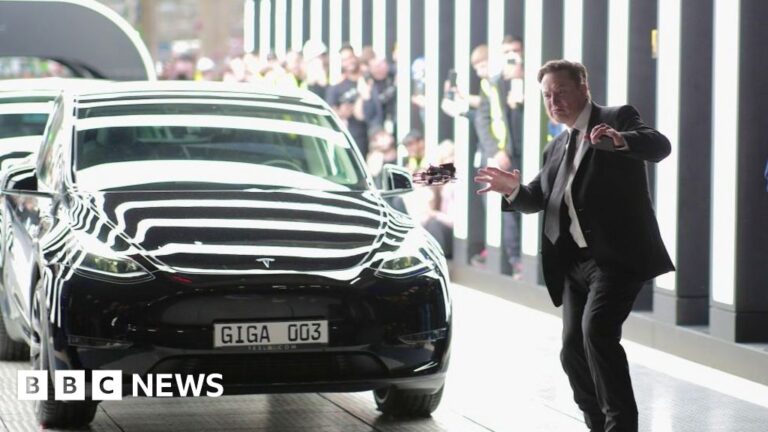image source, Getty Images
Elon Musk is visiting Beijing to discuss enabling self-driving mode for Tesla cars in China, according to media reports.
Musk wants to achieve fully self-driving cars (FSD) in China and transfer data collected domestically overseas to train algorithms.
FSD is available in countries including the United States, but not in China.
The news comes after a U.S. report linked Tesla’s self-driving mode to at least 13 crashes, including one fatality.
China is Tesla’s second-largest market. Other automakers, such as Guangzhou-based Xpeng, are also trying to compete with Tesla by equipping their cars with similar self-driving features.
Electric car makers have previously taken steps to reassure Chinese authorities about the rollout of FSD in the country, including establishing a data center in Shanghai to process data on Chinese consumers in accordance with local law.
The trip comes days after the National Highway Traffic Safety Administration (NHTSA) announced it was investigating whether a recall successfully addressed safety concerns about Tesla’s driver-assistance systems.
NHTSA says that even though drivers must remain focused on the road and ready to take control at a moment’s notice when autonomous driving is enabled, drivers involved in crashes are not “fully involved.” There wasn’t.” The regulator’s analysis was conducted before the recall that Tesla announced would fix the problem.
Tesla’s software is supposed to ensure that drivers are paying attention and that features are only used in appropriate situations, such as highway driving.
Musk has promised that Tesla will be able to function as an autonomous “robotaxis” for years. In 2015, he said Tesla would achieve “full autonomy” by 2018. And in 2019, the company said it would have robotaxis in operation by the following year.
Tesla’s CEO said this month that the company’s robotaxis will be unveiled in August.
Critics say Mr. Musk has consistently touted the prospect of fully self-driving cars to support stock prices against a backdrop of challenges such as declining global demand for electric vehicles and competition from cheaper Chinese manufacturers. He blames it. Mr. Musk denies the accusations.
Carmarker’s profits plunged to $1.13bn (£910m) in the first three months of this year, compared with $2.51bn in 2023. The company’s stock price has fallen 43% this year.

